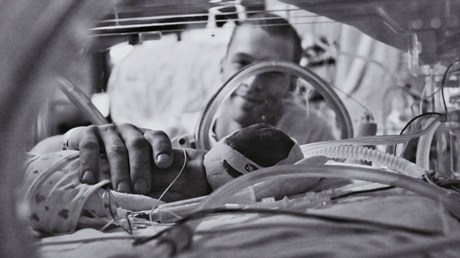Does NICU technology change our pro-life obligations?

Just like when God created the world in Genesis, our first assessment of new life comes down to breath. Moms wait for that telltale cry when a newborn sucks in his first gulp of air. Doctors often measure viability—whether the baby can survive outside the womb—by their ability to breathe.
Back in the 1960s, babies born at 36 weeks or earlier regularly died of respiratory distress syndrome because their lungs were not ready to function on their own. Doctors now understand that these young babies need surfactant in their lungs—like a lubricant that keeps their tiny air sacs from sticking shut—and technology has brought us an artificial substance to help.
Because of this development, babies born earlier and earlier have better odds of survival. Recent research shows that over the past 20 years the survival rate for babies born before 28 weeks has doubled. Babies born as young as 22 weeks—that’s more than four months early—still have a slim chance.
Step into any neonatal intensive care unit (NICU) in America, and you’ll see how modern medicine has advanced the pro-life cause. Babies whose survival was once declared impossible now live, grow, and thrive. My own twins—born at 31 weeks and six days—were saved by such technology.
But these developments have also raised new moral and ethical questions. As a pro-life Christian, of course I believe life begins at conception. But when do I believe life is viable? Do we take our cues from medical science here?
The Supreme Court declares abortion legal for all non-viable fetuses, meaning that the earlier a baby can survive the harder it becomes to use viability as a pro-choice argument. The NICU proves that life begins far earlier …
